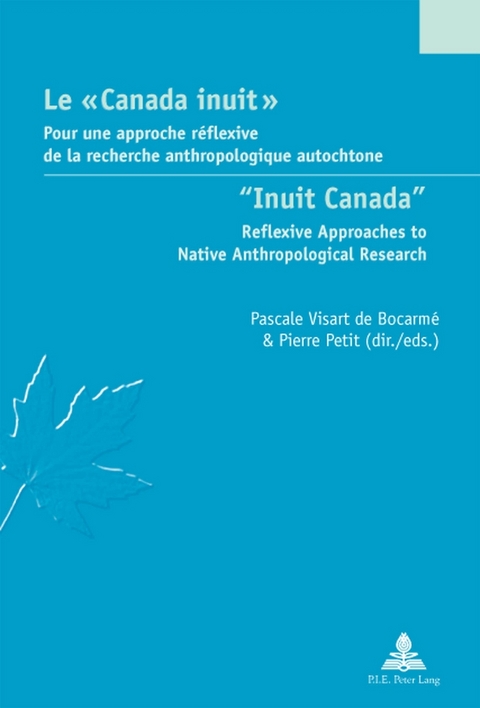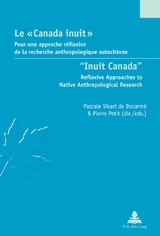Le « Canada inuit » / "Inuit Canada"
Presses Interuniversitaires Europeennes (Verlag)
978-90-5201-427-2 (ISBN)
- Titel z.Zt. nicht lieferbar
- Versandkostenfrei
- Auch auf Rechnung
- Artikel merken
Que signifie ce partenariat et quels sont ses fondements idéologiques ? Comment les anthropologues réagissent-ils à la multiplication des procédures d’accès au terrain et autres contraintes déontologiques ? Que penser du statut des « elders », devenus interlocuteurs privilégiés des nouveaux projets pédagogiques et d’une anthropologie souvent tournée vers l’idée de sauvetage culturel ? Quelle place pour l’anthropologie de la jeunesse et comment aborder les rapports interculturels entre les Inuit et la société eurocanadienne ?
Le présent ouvrage aborde ces interrogations épistémologiques sensibles et engage à une pratique prononcée de la réflexivité dans ce contexte en constante évolution, où l’implication citoyenne du chercheur est hautement valorisée.
In the wake of the upheavals caused by the shift to a sedentary lifestyle in the 1950s, and after a long political struggle, Inuit societies are now obtaining forms of territorial autonomy. In Nunavut, and other places, a new partnership is being formed, and the government is counting on anthropologists to participate in this cultural renewal which draws on ‘traditions’ in order to face the challenges of the present.
What is the significance of this partnership, and what is its ideological grounding? How have anthropologists reacted to the emergence of new procedures for access to the field and other deontological constraints? What of the status of elders, who have become central agents in pedagogical projects, as well as in an anthropology often geared to the idea of cultural salvage? What place can be made for an anthropology of youth, and how are the relationships between Inuit communities and Euro-Canadian society to be approached?
This volume tackles these sensitive theoretical questions, and urges a distinctly reflexive practice in this constantly evolving context, one in which the scholar’s civic engagement is highly valued.
Contenu/Contents: Pierre Petit/Pascale Visart de Bocarmé : Introduction. Le « Canada inuit ». Pour une approche réflexive de la recherche anthropologique autochtone - Introduction. «Inuit Canada». Reflexive Approaches to Native Anthropological Research – Willem C. E. Rasing: Law, Politics and Anthropology. Political, scientific and ethical aspects of legal-anthropological research in Arctic Canada & Nunavut (1978-2005) – Johanna Bergé-Gobit : La relation observateur/observé. Penser le contact interculturel – Pascale Visart de Bocarmé : Kangiqliniq/Rankin Inlet. Ce que la production artistique donne à voir et que l’art n’a pas pour vocation de montrer – Michelle Daveluy : La cohabitation des peuples au Canada inuit – Anne-Pascale Targé : Perspectives inuit sur les savoirs oraux – Frédéric Laugrand/Cornelius Remie/Jarich Oosten: The Dynamics of Inuit Shamanism in Nunavut.
| Erscheint lt. Verlag | 16.7.2008 |
|---|---|
| Reihe/Serie | Etudes canadiennes /Canadian Studies ; 15 |
| Études canadiennes – Canadian Studies ; 15 | Études canadiennes – Canadian Studies ; 15 |
| Mitarbeit |
Herausgeber (Serie): Serge Jaumain |
| Verlagsort | Bruxelles |
| Sprache | englisch; französisch |
| Maße | 220 x 150 mm |
| Gewicht | 280 g |
| Themenwelt | Geisteswissenschaften ► Geschichte ► Regional- / Ländergeschichte |
| Sozialwissenschaften ► Ethnologie ► Völkerkunde (Naturvölker) | |
| Sozialwissenschaften ► Soziologie ► Allgemeines / Lexika | |
| ISBN-10 | 90-5201-427-2 / 9052014272 |
| ISBN-13 | 978-90-5201-427-2 / 9789052014272 |
| Zustand | Neuware |
| Haben Sie eine Frage zum Produkt? |
aus dem Bereich




